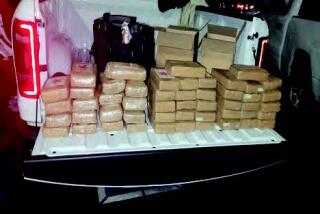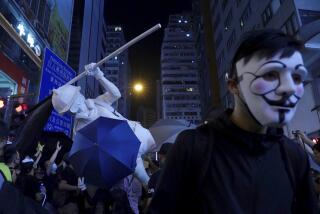Investors in Hong Kong Turn to U.S. as Turmoil in China Rocks Economy
- Share via
Hong Kong investors have begun moving more capital out of the British colony and expressed heightened interest in U.S. real estate amid the escalating unrest in China and the plunge in Hong Kong stock and real estate prices.
So far, the new wave of capital flight does not appear to be a mass exodus. But the outflow is expected to grow if violence and instability in China continue or a new government emerges that is hostile to preserving the free-wheeling economic system in Hong Kong when China takes over in 1997, U.S. bankers and others said Tuesday.
“We’ve seen some activity in wiring money out of Hong Kong, but it’s not significant yet,” reported Dunson Cheng, president of Los Angeles-based Cathay Bank, which has depositors from Hong Kong.
“In the last day or two, we’ve had a couple of modest transfers, but it’s nothing like you could say there’s a tremendous flight out of Hong Kong,” said an official of a major U.S. bank with operations in Hong Kong.
Despite a strong economy in recent years, Hong Kong already has an exodus of people and money, stemming from the 1984 agreement by the British government to turn over the colony to China.
No one knows for sure just how much money has left Hong Kong in recent years, but 75,000 of the colony’s residents are estimated to have emigrated in the past two years. Seven of every 10 people in Hong Kong either fled from communism in China or have at least one parent who did so, and thus there is a large mistrust of the Chinese government and its promises to preserve Hong Kong’s entrepreneurial freedoms.
Following news of the Beijing massacres, Hong Kong investors in recent days have increased investments in U.S. and other overseas savings deposits and Treasury securities, experts say. Bankers also report widespread conversions of Hong Kong dollars into U.S. dollars or other foreign currencies. Some of this investment helped boost prices of the U.S. dollar and Treasury bonds Monday.
Hong Kong share prices Monday registered their worst loss since the worldwide market collapse in 1987, but rebounded slightly Tuesday. The Hang Seng Index of blue chip stocks closed at 2,149.71, up 56.1 from Monday, when it fell 581.77. Meanwhile Tuesday, the Hong Kong dollar continued to come under strong selling pressure as investors sought a safer haven in the U.S. dollar.
“You are seeing funds being transferred out of Hong Kong into a lot of short-term investments” such as one- or three-month certificates of deposit, said an official of a large multinational U.S. bank who handles clients from Asia.
Some Hong Kong investors also are inquiring about American real estate in the wake of reports that prices of some real estate in Hong Kong have dropped as much as 20% in recent days.
“It’s amazing how fast it’s happened,” said Clifton K. Chang, a partner at Altair Investment Co., a Los Angeles real estate development and investment firm. He noted that some Hong Kong investors flew here just in the past two days to investigate commercial properties in Southern California.
“In Hong Kong, business runs on fear and greed,” Chang said. “For the past two years, greed’s been driving it. For the past week, fear’s been in.”
Any continued capital outflow, experts say, would reflect more than just fears that China may renege on its promise to maintain the capitalist system in Hong Kong.
Heightened capital flight also would reflect a redirection of Hong Kong investment away from China. Hong Kong has been the largest foreign investor in China, surpassing Japan and the United States. But Hong Kong investors, like those anywhere else, prefer nations with political and economic stability, conditions which may no longer be assured in China.
New outflows also could reflect the growing international exposure of the new generation of Hong Kong business leaders. Many are in their 30s and 40s, studied in the United States and have many friends here.
Taking capital out of Hong Kong is not difficult. Many large U.S. and European banks maintain branches there. A Hong Kong resident can simply open an account and have funds wired overseas for safekeeping.
Or a Hong Kong resident can buy deposits in the form of Eurodollars--a term for U.S. dollars deposited outside the United States, says Cheng of Cathay Bank. They pay higher rates, but the money is still considered to be in Hong Kong.
Some wealthy Hong Kong investors also have created “shell” corporations to invest their money in such unregulated havens as the Bahamas.
Canada also is another popular destination of Hong Kong money, because that nation grants immigrant visas and eventual citizenship to Hong Kong residents who invest large sums of money there. Canada also pays high interest rates, averaging about 13% to 14% for large multimillion-dollar deposits, versus about 9% to 10% in the United States, said one U.S. banker.
But despite the lure of overseas havens, many Hong Kong investors don’t yet appear to be rushing to take out all their money, wanting to see how things shake out in Beijing, bankers said.
“I think there is a lot of wait-and-see attitude right now, (waiting) to see which way this is going to go and who is going to take charge,” said one U.S. banker with Asian operations.
However, a surge of interest among Hong Kong investors in Southern California real estate could reverse recent buying patterns.
Hong Kong real estate investors--while continuing to make acquisitions--had kept a lot of their money back home because Hong Kong real estate prices had risen as much as 25% to 35% a year, real estate developer Chang said.
As a result, Hong Kong investors generally have not purchased “showcase” properties in North America, as have the Japanese. Two notable exceptions were the purchase of the Beverly Wilshire Hotel by a Hong Kong investment firm and the acquisition of the Vancouver world’s fair site by wealthy Hong Kong industrialist Li Ka Shing.
But Chang predicted that Hong Kong real estate investments here now could surge in the next six months, because Hong Kong investors--unlike the Japanese--move quickly.
“The Hong Kong guys are traders at heart,” Chang said. “Wherever the winds are blowing they are quick to sense it and react. Two years is long term for the Hong Kong guys.”
Added Chang: “Some of the people who were interested before but said, ‘Now is not the time,’ are now saying ‘Now is the time.’ ”
GOLD PRICES RISE: Gold rose nearly $12 an ounce Tuesday, while the dollar slipped. Page 4
U.S. TRADE WITH CHINA
U.S. Exports to China
Leading 1988 exports, in millions of dollars Wheat: $697.8 Polyethylenes: 542.8 Rough woods: 437.8 Fertilizers: 378.7 Aircraft: 334.6 Measuring instruments: 193.1 Misc. machinery: 188.8 Computers: 153.1 Carboxylic acids: 146.9 Telecom. equipment: 97.7
U.S. Imports From China
Leading 1988 imports, in millions of dollars Toys and games: $1,168.1 Women’s outerwear: 733.6 Knit clothing: 508.4 Luggage: 461.9 Crude oil: 437.7 Misc. manufactures: 364.1 Footwear: 364.1 Men’s outerwear: 333.1 Household appliances: 318.2 Tents and cloth bags: 298.9 Source: Commerce Department via Associated Press
More to Read
Inside the business of entertainment
The Wide Shot brings you news, analysis and insights on everything from streaming wars to production — and what it all means for the future.
You may occasionally receive promotional content from the Los Angeles Times.









